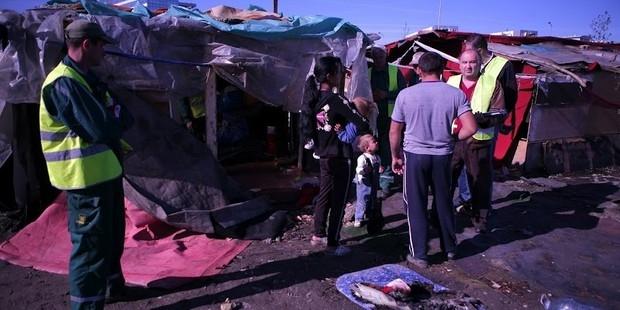(English) April 26, 2012

Some 250 Roma families were forcibly evicted from Belgrade's Belvil settlement despite a lack of proper consultation. Photo: Biliana Rakocevic
Belgrade city authorities are proceeding with a mass forced eviction on Thursday in the capital’s Belvil’s settlement despite failing to consult the Roma communities affected, denying them adequate information, notice and legal remedies, Amnesty International said.
The lack of consultation has meant that some of the 250 families may have been split up while others now face homelessness.
“The Serbian government is flagrantly violating international law by allowing Belgrade city authorities to carry out this eviction,” said John Dalhuisen Amnesty International’s Europe and Central Asia Director.
“We reiterate our call for a law which would prohibit forced evictions and stipulate safeguards for all evictions to prevent the blatant breach of international law we have seen again today in Belvil.”
Belgrade police and city authorities were not using force during Thursday’s eviction, which was being monitored by the media as well as representatives from Amnesty International and local NGOs, UN organizations, the EU delegation in Serbia and the Organization for Security and Cooperation in Europe,.
But the lack of prior consultation was clearly taking its toll on Belvil’s residents, who were left frightened and confused amid the eviction.
“People are coming up to us, with tears in their eyes, asking us what they should do and where they should go,” said an Amnesty International observer present at the eviction.
A pregnant 17-year-old girl has been told she will be sent to the town of Nis in southern Serbia, where she has no home, and nowhere to stay.
In another case, members of the same family are being sent to different sites around Belgrade.
Families whom the authorities registered as Belgrade residents have already been taken to four segregated container settlements around the city, as has been the case with Roma evicted from other informal settlements since 2009.
Amnesty International is concerned that several families who were told they would go to a site at Rakovica may be taken to another site at Resnik where the local community have been demonstrating for weeks against the new Roma container settlement.
It is likely that the Roma will live in metal containers – which do not meet international adequate housing standards – for several years. Although they have been able to take their belongings, they have not been allowed to take the scrap materials from which they earn their living, and have been told that they cannot collect or store scrap at the container sites.
The impact of the lack of consultation is already obvious.
A woman with a disability who uses a wheelchair has been sent to a site far away from where her daughter – who cares for her – lives. Only this morning, after she spoke with NGOs, the authorities promised they will move her from that site in a week or so, but the damage has been done.
Another man who refused a container, as it was too far from where he worked, now has no idea what will happen to him.
A group of more than 100 families will be put on buses and returned to other parts of Serbia, where some of them have told Amnesty International that they have nowhere to live.
“What is going to happen to us, what is going to happen to people from the south, what will happen to the children, sick and disabled? We tried to ask [the city representative] some concrete questions, but his answers were very general – they were not really answers,” members of one family told Amnesty International.
Many Roma moved to Belgrade from elsewhere in Serbia to find work and support their families.
Some told Amnesty International that conditions were better for them in Belvil: “We have children who go to school here and they are doing well. What will we do in the south? How will we send them to school there with no money at all?”
Research by Serbian NGOs over the past few days suggests that few of the municipalities where people will be returned are adequately prepared to receive them, causing great anxiety and uncertainty among those who are being sent back on buses today.
Only the families living on the site of an access road due to be built in September will remain, to be moved once construction on the road begins. The families who were evicted on Thursday were not living along the route of this planned road, and were not given a reason for being moved.
“The uncertainty faced by these people and many others shows clearly that there has been no genuine and adequate consultation with the Roma community, and shows how necessary such consultation is,” said Dalhuisen.
“Along with local NGOs, we have monitored the process leading up to the Belvil evictions, and have witnessed the lack of information, due process and consultation. The end result is sadly playing out in front of our eyes as the mass eviction devastates the lives and rights of the Roma community.”
Source: Amnesty International

Deixe um comentário